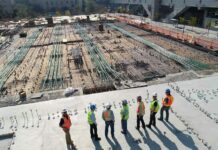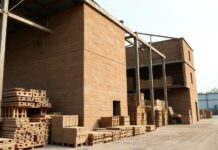The construction output in the UK is all set to dip by 2.1% in 2024 because of falls in private housing newbuild work as well as repair, maintenance, and also improvement, as per the Construction Products Association- CPA.
Apparently, the industry’s two biggest sectors happen to be hit by increasing mortgage rates as well as the cost-of-living crisis, both symptoms highlighting high levels of inflation in the years that have gone by.
It is well to be noted that private housing output went on to suffer a double-digit dip in 2023, with some housebuilders going on to report a demand fall of almost 35%, while the present regulatory issues when it comes to planning, which include nutrient neutrality, have gone on to contribute costs that are higher.
The sector is anticipated to see a fall of another 4% in 2024 as per the CPA’s winter forecast, but also an enhancement of the same amount in 2025 if interest rates begin to dip as expected.
However, the report also warned that a dearth when it comes to the government policy stimulus so as to help overcome high deposit as well as mortgage payments means the recent housebuilding high in 2022 is not likely to be seen again until at least by the end of this decade.
It is well to be noted that private housing repair and maintenance- RMI, which happens to be the second largest construction sector, also seeks to be continuing its trend downwards due to householders not having spare cash to pay for the works.
Less property purchases in 2023 have gone on to contribute to the demand fall from new homeowners, who typically make enhancements within the first nine months of moving in.
RMI is also likely to see a dip at the same rate as new private housing, 4%, in 2024 before returning to a progress of 3% in 2025, the CPA said, but it also flagged the likelihood of a robust market in energy efficiency as well as insulation retrofit jobs.
Apparently, the interest rates at present stand at 5.25%, which happens to be the highest level in the last 15 years. The fact is that the Bank of England is going to review the rate on February 1 but is not likely to decrease it due to an uptick in inflation in December from 3.9% to 4%.
Noble Francis, CPA economics director, opined that even with the anticipated falls in interest as well as mortgage rates in the second half of 2024, rates are most likely to stay relatively high, and hence the demand in the housing market, house building sector, as well as RMI sector is most likely to remain subdued entirely.
Francis went on to criticize the dearth of help when it comes to housing in the chancellor’s autumn statement in 2023. He adds that it is indeed very crucial that one looks out for measures in order to help boost house building along with homeownership from the government in the spring budget that is coming up.
Moreover, the UK government should do more when it comes to infrastructure delivery, given that the industry is set for its third consecutive dip in output. This is in spite of the announcements from the government in terms of new projects so as to compensate for the cancellation of the northern leg of HS2.
Apparently, the infrastructure, which happens to be the third largest sector, is also anticipated to fall by 0.5% this year in spite of the work continuing on the first phase of HS2, the Thames Tideway Tunnel, and the Hinckley Point C nuclear power station before increasing by 1.2% in 2025.




























